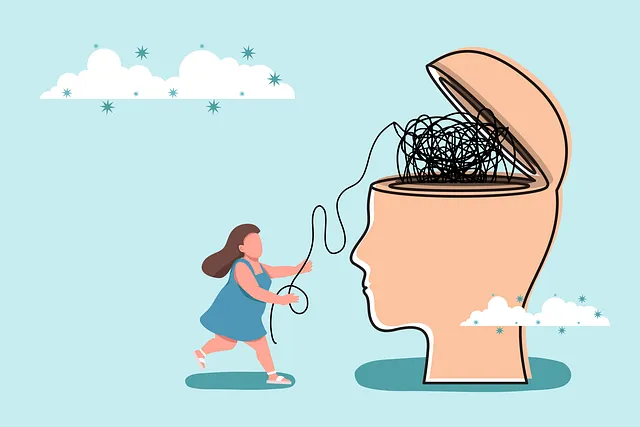The Kaiser Permanente mental health facility in Castle Rock emphasizes that early recognition of depression is crucial. They highlight specific signs like persistent hopelessness and changes in appetite, sleep, and concentration as key indicators. The facility promotes proactive mental wellness through education, coping skill enhancement, and lifestyle modifications such as regular exercise and mindfulness. Evidence-based therapies like Cognitive Behavioral Therapy (CBT) and personalized coaching programs are offered. Building a strong support network and fostering cultural sensitivity in healthcare are also seen as vital depression prevention strategies.
Depression is a prevalent and serious mental health condition, yet it’s preventable. This article explores comprehensive strategies to combat depression before it takes hold. We delve into recognizing key signs and symptoms, highlighting the crucial role of facilities like the Kaiser Permanente Mental Health Facility in Castle Rock for proactive prevention. Additionally, we cover lifestyle changes, evidence-based therapies, and the significance of building a supportive social network for enhanced mental well-being. By understanding these aspects, individuals can empower themselves to take charge of their mental health.
- Understanding Depression: Recognizing the Signs and Symptoms
- The Role of Kaiser Permanente Mental Health Facility Castle Rock in Prevention
- Lifestyle Changes for Enhanced Mental Well-being
- Evidence-Based Therapies for Proactive Mental Health Management
- Building a Supportive Network: Social Connections and Depression Prevention
Understanding Depression: Recognizing the Signs and Symptoms

Depression is a complex mental health condition that affects millions worldwide. Recognizing its signs and symptoms is a crucial step in prevention and early intervention. At Kaiser Permanente’s mental health facility in Castle Rock, experts emphasize that understanding depression goes beyond a fleeting bad mood or temporary sadness. It involves persistent feelings of hopelessness, loss of interest in activities once enjoyed, changes in appetite and sleep patterns, fatigue, difficulty concentrating, and even recurrent thoughts of death or suicide.
The facility advocates for fostering emotional intelligence as a key strategy to prevent and manage depression. This includes recognizing and understanding one’s emotions, as well as developing coping skills to navigate life’s challenges. Enhancing mood management techniques, such as engaging in regular physical activity, maintaining a balanced diet, and practicing mindfulness or relaxation exercises, can also play a significant role. By prioritizing mental well-being and equipping individuals with effective coping skills, Kaiser Permanente’s Castle Rock facility aims to empower people to recognize early warning signs and seek support before depression becomes severe.
The Role of Kaiser Permanente Mental Health Facility Castle Rock in Prevention

The Kaiser Permanente mental health facility in Castle Rock plays a pivotal role in depression prevention strategies, offering comprehensive services that address both immediate crisis and long-term wellness. This facility prioritizes early intervention, providing accessible care through an integrated network of professionals who specialize in various therapeutic approaches. By combining evidence-based treatments like Mindfulness Meditation with risk assessment tools for mental health professionals, they create a supportive environment aimed at reducing the stigma associated with mental illness.
Through regular workshops and outreach programs, the Castle Rock facility educates both patients and the broader community about recognizing symptoms of depression and available treatment options. Their focus on Mental Illness Stigma Reduction Efforts fosters understanding and encourages individuals to seek help without fear of judgment. This holistic approach not only empowers individuals to manage their mental health proactively but also contributes to a more supportive and inclusive societal environment.
Lifestyle Changes for Enhanced Mental Well-being

Making positive lifestyle changes is a powerful tool for enhancing mental well-being and preventing depression. At Kaiser Permanente mental health facility in Castle Rock, professionals emphasize the significance of a balanced approach to life. This includes regular physical activity, which releases endorphins that can boost mood and reduce stress. Adequate sleep is another crucial factor; prioritizing consistent rest can significantly impact emotional stability.
Additionally, fostering strong social connections through meaningful relationships and community engagement has proven effective in maintaining good mental health. Public Awareness Campaigns aimed at promoting these strategies can play a vital role in empowering individuals to take charge of their well-being. Cultivating confidence through achievable goals and practicing positive thinking can also serve as protective measures against depression, creating a more resilient mindset.
Evidence-Based Therapies for Proactive Mental Health Management

At the Kaiser Permanente mental health facility in Castle Rock, evidence-based therapies play a pivotal role in proactive mental health management. These therapeutic approaches, backed by extensive research and clinical trials, offer effective strategies to prevent and mitigate depression. One such approach is Cognitive Behavioral Therapy (CBT), which focuses on identifying and changing negative thought patterns and behaviors contributing to depressive symptoms. This therapy has proven successful in enhancing individuals’ coping mechanisms and promoting mental wellness.
Additionally, Mental Wellness Coaching Programs developed within the Kaiser Permanente facility integrate personalized support with evidence-based practices. These programs aim to build confidence and resilience, empowering individuals to proactively manage their mental health. Through regular sessions with trained coaches, participants gain valuable skills for stress management, emotional regulation, and fostering a positive mindset—crucial elements in depression prevention. Moreover, risk assessments conducted by mental health professionals at these facilities help identify individuals at higher risk, allowing for early intervention and tailored support.
Building a Supportive Network: Social Connections and Depression Prevention

Building a strong support network is an essential aspect of depression prevention, as social connections play a pivotal role in maintaining mental wellness. The Kaiser Permanente mental health facility in Castle Rock emphasizes the power of community and relationships in fostering resilience against depressive disorders. Strong social ties provide individuals with emotional support, encouragement, and a sense of belonging, which are crucial for navigating life’s challenges.
At-risk individuals can benefit from cultivating diverse connections, including family, friends, peers, and even professional support groups. Engaging in activities that promote social interaction, such as joining community clubs or participating in mental wellness journaling exercises, can help create a sense of purpose and belonging. Cultural sensitivity in mental healthcare practice is also vital, ensuring that individuals from various backgrounds feel understood and supported within their communities. Additionally, risk management planning for mental health professionals encourages the creation of safe, supportive environments where individuals can openly discuss their struggles without fear of judgment.
Depression prevention is a multifaceted approach, and integrating strategies from various sections can significantly enhance mental well-being. The article has explored key aspects, including recognizing depressive signs, the vital role of facilities like Kaiser Permanente Mental Health Facility Castle Rock in proactive management, lifestyle changes for improved mental health, evidence-based therapies, and the power of social connections. By adopting these strategies, individuals can navigate and prevent depression, fostering a more resilient and balanced life.






